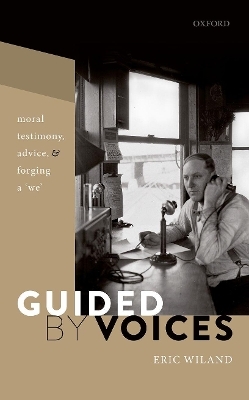
Guided by Voices
Moral Testimony, Advice, and Forging a 'We'
Seiten
2021
Oxford University Press (Verlag)
978-0-19-886479-0 (ISBN)
Oxford University Press (Verlag)
978-0-19-886479-0 (ISBN)
We often rely on others for guidance about what to do. But wouldn't it be better to rely instead on only our own judgment? Eric Wiland argues that we can accept moral testimony without loss, that there are several distinctive social goods attainable by being guided by others, and that sometimes taking another's advice is the only way to act well.
We often rely on others for guidance about what to do. But wouldn't it be better to rely instead on only your own solo judgment? Deferring to others about moral matters, after all, can seem to conflict what Enlightenment demands.
In Guided by Voices, however, Eric Wiland argues that there is nothing especially bad about relying on others in forming your moral views. You may rely on others for forming your moral views, just as you can your views about anything else. You can accept moral testimony without loss. Furthermore, there are several distinctive social goods attainable by being guided by what others say. Thus, it can be better to be guided by moral testimony than by your own moral lights.
Wiland also argues that relying on others for moral advice has one advantage over relying on others for moral testimony. For when you trust your adviser's advice, you both thereby form a joint agent that can achieve autonomy, moral understanding, and morally worthy action. Sometimes taking another's advice is your only way to act well.
Arguing against the presumption that moral reasoning is ideally done alone, Guided by Voices is the first book to address moral testimony and advice.
We often rely on others for guidance about what to do. But wouldn't it be better to rely instead on only your own solo judgment? Deferring to others about moral matters, after all, can seem to conflict what Enlightenment demands.
In Guided by Voices, however, Eric Wiland argues that there is nothing especially bad about relying on others in forming your moral views. You may rely on others for forming your moral views, just as you can your views about anything else. You can accept moral testimony without loss. Furthermore, there are several distinctive social goods attainable by being guided by what others say. Thus, it can be better to be guided by moral testimony than by your own moral lights.
Wiland also argues that relying on others for moral advice has one advantage over relying on others for moral testimony. For when you trust your adviser's advice, you both thereby form a joint agent that can achieve autonomy, moral understanding, and morally worthy action. Sometimes taking another's advice is your only way to act well.
Arguing against the presumption that moral reasoning is ideally done alone, Guided by Voices is the first book to address moral testimony and advice.
Eric Wiland is Professor of Philosophy at the University of Missouri - St. Louis, author of Reasons (2012), and organizes the St. Louis Annual Conference on Reasons and Rationality (SLACRR).
1: Accepting Moral Testimony
2: Epistemic Problems of Moral Testimony
3: Moral Testimony and the Value of Moral Understanding
4: Autonomy and Moral Testimony: A Threat?
5: Epistemic Injustice and Epistemic Solidarity
6: The Nature of Advice
7: Advising Duos and Join Agency
| Erscheinungsdatum | 08.04.2021 |
|---|---|
| Verlagsort | Oxford |
| Sprache | englisch |
| Maße | 143 x 224 mm |
| Gewicht | 358 g |
| Themenwelt | Geisteswissenschaften ► Philosophie ► Erkenntnistheorie / Wissenschaftstheorie |
| Geisteswissenschaften ► Philosophie ► Ethik | |
| ISBN-10 | 0-19-886479-5 / 0198864795 |
| ISBN-13 | 978-0-19-886479-0 / 9780198864790 |
| Zustand | Neuware |
| Haben Sie eine Frage zum Produkt? |
Mehr entdecken
aus dem Bereich
aus dem Bereich
die Grundlegung der modernen Philosophie
Buch | Softcover (2023)
C.H.Beck (Verlag)
CHF 25,20
Buch | Softcover (2023)
Reclam, Philipp (Verlag)
CHF 9,80


![Was heißt Denken?. Vorlesung Wintersemester 1951/52. [Was bedeutet das alles?] - Martin Heidegger](/media/113619842)